PRINCETON, NJ -- While the majority of Americans appear to have made up their minds on healthcare reform, 39% say their support for a final healthcare bill will depend on how the details still being worked out in Congress are resolved.
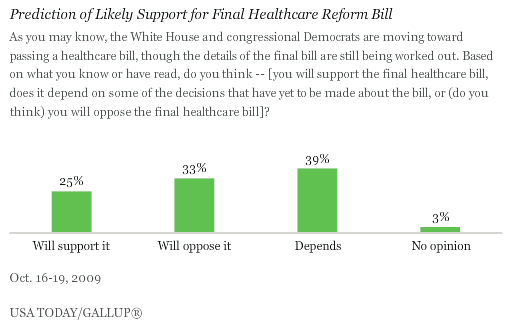
The finding comes from a USA Today/Gallup poll conducted Oct. 16-19. In addition to the 39% of Americans still on the fence, 25% say they have already decided to support the final bill while a slightly larger number, 33%, say they will oppose it.
"By 58% to 38%, Americans would generally prefer to see Congress deal with healthcare reform 'on a gradual basis over several years' rather than 'try to pass a comprehensive reform plan this year.'"
The percentage of Republicans saying they will oppose the final healthcare bill is higher than the percentage of Democrats who will support it, 62% vs. 47%, largely because more Democrats than Republicans are reserving their final judgment until the details of the legislation are worked out. Independents say they will oppose it by about 2 to 1, 36% vs. 19%, while the largest segment of this politically unanchored group (42%) says it depends.
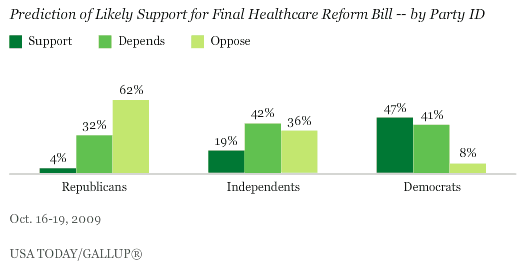
The Prospect of a Public Option
With respect to one of the more contentious issues being debated -- whether the plan should include a government-run insurance plan to compete with private providers (a so-called public option) -- Americans are about evenly split, with 50% in favor and 46% opposed.
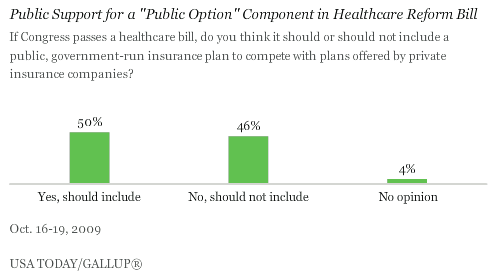
Medicare Cuts Put Off Many
The new poll also asked Americans about three potential ways to pay for the healthcare bill. The public favors raising federal income taxes on high-income Americans; however, it broadly opposes reducing Medicare payments to doctors and hospitals, and taxing insurance plans that contain expensive benefits.
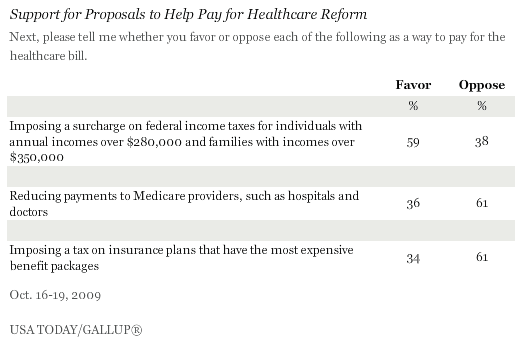
The views of the 39% who are undecided on healthcare may be of particular interest to the nation's lawmakers. The poll suggests these Americans would generally be receptive to a bill that includes a public option (56% are in favor), as well as one that raises income taxes on the wealthiest Americans to help pay for the plan (67% in favor). At the same time, they join the general public in opposing a reduction in Medicare payments to doctors and hospitals (62% opposed) and taxing insurance plans that contain expensive benefits (59% opposed).
Outright supporters of any healthcare reform bill widely back taxing the wealthy (82% are in favor) and including a public option (80%). A smaller majority favor taxing expensive benefit plans (58%), but supporters are split on reducing federal payments to Medicare providers: 48% are in favor and 49% opposed.
Outright opponents of any healthcare reform bill show broad opposition to all four provisions that might be included, but are particularly united against taxing healthcare plans that contain expensive benefits (82% are opposed).
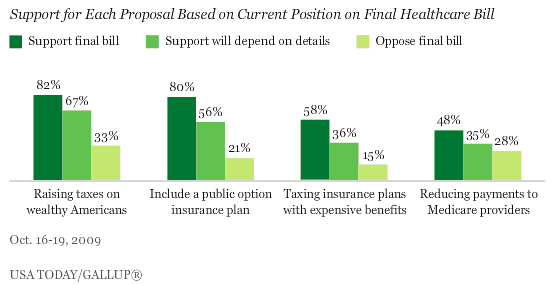
In a follow-up question, Gallup pressed Americans who say their support for a healthcare reform bill "depends" to predict what their position is likely to be once the details of the bill are worked out. Slightly more believe those decisions will cause them to support the final bill than to oppose it. When these "leaned" views are added into the equation, Americans overall appear closely split in their support of healthcare reform. Just under half -- 49% -- are opposed to the final bill or think they will be opposed to it; 44% support it or lean that way.
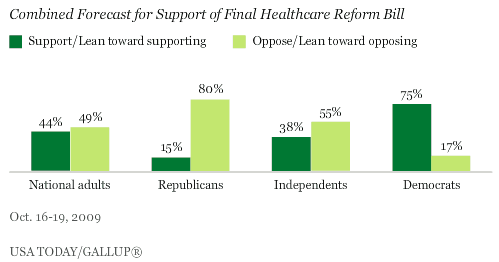
What's the Hurry?
By 58% to 38%, Americans would generally prefer to see Congress deal with healthcare reform "on a gradual basis over several years" rather than "try to pass a comprehensive healthcare reform plan this year." Advocates of the go-slow approach include 77% of Republicans and 63% of independents, compared with 39% of Democrats.
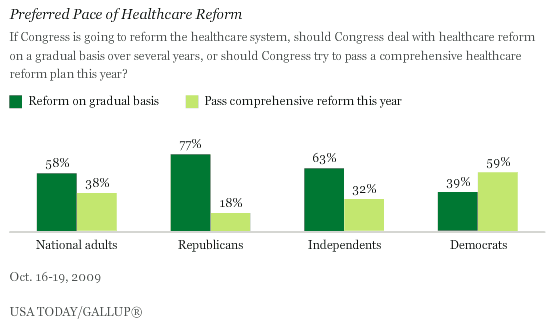
Notably, a slightly smaller majority of Americans today would rather see Congress take its time than said this toward the end of the healthcare reform debate in 1994 under President Bill Clinton. In August 1994 -- just as Congress was taking up a major healthcare reform compromise bill, and about a month before the bill was declared dead -- 68% of Americans said they preferred dealing with healthcare reform gradually while 28% wanted it passed that year.
Bottom Line
As the nation's elected representatives inch closer to fashioning a compromise healthcare reform bill to bring to the House and Senate floors for a final vote, Americans are still quite ambivalent on the issue. Roughly 4 in 10 are withholding final judgment until they see more specifics on the many unresolved details.
With more Democrats than Republicans falling into this "uncertain" category, it appears that the inclusion of a public option and other more liberal-oriented measures could be crucial to winning their backing. However, reducing payments to Medicare providers has the potential to deter support. Not only is this proposal broadly opposed by those who are uncertain about healthcare reform, but it divides even reform proponents.
Survey Methods
Results are based on telephone interviews with 1,521 national adults, aged 18 and older, conducted Oct. 16-19, 2009, including an oversample of 408 blacks, consisting of 102 interviews done as part of the random national sample and 306 interviews with blacks who had previously participated in national Gallup Polls and agreed to be re-interviewed at a later date. The data from the national sample and re-interviews are combined and weighted to be demographically representative of the national adult population in the United States and to reflect the proper proportion of blacks in the overall population. For results based on the total sample of national adults, one can say with 95% confidence that the maximum margin of sampling error is ±3 percentage points.
Interviews are conducted with respondents on land-line telephones (for respondents with a land-line telephone) and cellular phones (for respondents who are cell-phone only).
In addition to sampling error, question wording and practical difficulties in conducting surveys can introduce error or bias into the findings of public opinion polls.
